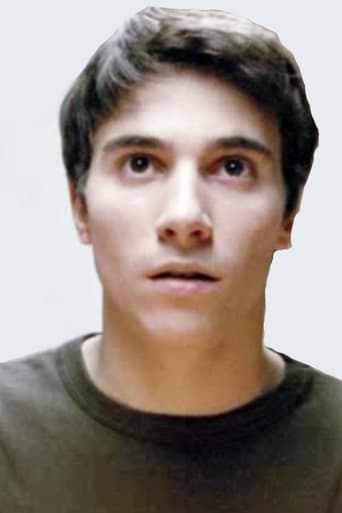Alex Vojacek
I am sorry but I totally disagree with the other review of this movie. Before I start this review let me state that, I am from Argentina, I do like movies from my own country but, only a few I fell deserve recognition , this one is one the the most underestimated movies of all time in my country, almost zero recognition and to me, one of the most beautiful of all.Cinematic masterpiece for sure, the topic of OUIJA, friends with nothing more to do in a night, trying a little game and catching a spirit is something right out of Hollywood "cliche" routine, but, surprisingly brilliant in this little piece of drama-comedy done by indie Argentinians.Absolutely everything in this movie fits with perfect timing, although not all actors are good, the lead young actor and Ivan Espeche as Canaveri form a very magic duo that absolutely works on screen.The chemistry is there all the time, the humor parts are really funny and the serious parts are, well, deep. The movie has a beautiful redeeming ending with both a deep meaning to each of our characters and nice humor with it. I can't even begin to describe how beautiful this movie is, how good the subject of out of body, possession and spirits are handled by this movie, almost with utter respect yet with a fun side to it.It's amazing such a wonderful movie could be made with almost no actors, the two lead parts take about 85% of screen time. This young talented actors, directors and producers should be commended. This is what cinema is really about, telling a good story, following through without loosing it's touch, connecting with the viewers by showing the character's personalities and motivations and use humor to lighten up the mood. Simply beautiful, if you like ghost stories well written and full of good heart and redeeming qualities PLEASE go see this movie, it deserves your full attention.My score 10 out of 10 and one of the best underestimated jewels of Argentina cinema.
jpschapira
I look up to the FUC. The Argentine cinema university is a place where I'd study the art of film-making, and I acknowledge the merit of its students and what they've done: independently, the reference is Mariano Llinás and his "Historias Extraordinarias"; while among things done entirely by the FUC and its students, "Sólo por hoy" is a master's work (and a masterpiece, I convince myself every time I watch it again). With a background like this one, it's not so crazy to expect a lot from "Fantasma de Buenos Aires", the latest full-length feature the university has crafted. Directed and written by Guillermo Grillo, the film is recognizable. It's ours; because the language and references to the country's past are too many that probably an audience from outside would feel out of place. That's fine by me because I laughed with some jokes (that have to do, mainly, with the language) and some moments and reactions that are typical from this part of the world. And that's the first good thing about the movie: director Grillo is not afraid of making a fool of himself. He trusts his material and he bets on quiet scenes that involve one or two actors in dark, apparently dangerous places. The most recognizable of these is a room with a bar that, if the characters and their story were from any other place, the fact that the movie is ours would be completely lost. It's just that it's ours because it tries hard to be; Grillo's trust works to his favor here too. If you've lived in or visited Buenos Aires, you might recognize some places (street names, bus numbers), but the problem is that this feeling of belonging doesn't last too long; and it's like the movie carries itself to that room...To that bar in which reality doesn't matter that much. Tomás (Estanislao Silveyra) ends up in the little room because he plays a game –the "game of the wineglass", we call it here- with his friends. In Claudio's (an impressive Juan Diego West) big house they try to summon a spirit, and after they talk to him, the wineglass they were using accidentally breaks. "Now the spirit stays in the house", one of them says. They run off and the day after Tomás finds himself there, talking to the spirit of Canaveri (Iván Espeche). In the little room they both make a deal. Canaveri has unfinished business in the city and Tomás wants to know some things about the afterlife. What they decide is that the ghost will live in the boy's body for a few days, and his particular manners and how different they are from the contemporary Buenos Aires and, even more, from Tomás' personality, will drive the movie forward. At this point two plot lines are functioning: the sort of mystery of Canaveri's unfinished business with the past and the relationship of the ghost with the boy. The third plot line involves the romantic feelings Tomás has for Cecilia (María Paula Brasca), his friend Claudio's sister. The thing is that, to Grillo, these three directions are equally important. He does well in trusting his actors because they generally do a good job, and he does well in trusting his story because it's not boring and, as mentioned before, it's funny. I think he plays it wrongly when he doesn't find a center for his piece. The movie, which has the name of a city in its title, gives us a fragmented version of this city. We can identify Buenos Aires, and that makes "Fantasma" ours (partly), but this is a Buenos Aires that shows specific corners, selected areas that don't let the enormous city breathe. It's like feeling you belong to a place without being capable of sensing the place itself. In "Sólo por hoy", Ariel Rotter never explored every inch of Buenos Aires, but somehow, because of what he was telling and how he told it, the city was breathing in our faces. The romantic story and the relationship between the ghost and Tomás don't work for similar reasons. We don't know who these characters are; if they are in high school or college, if they live alone or with their parents, if they have any other life apart from the inner circle the film presents. Their personas, as the city Grillo shows, come to us in a fragmented way, and there's no trace in the film that might explain why this could be an intentional decision. A few conversations about careers, a few discussions about what to do with the spirit when that wineglass hits the floor...The rest is smoke; it's sadly meaningless.However, I think that what disappoints me the most is related to the visual search. The general confidence possessed by Grillo makes him forget about shooting, and the shots of "Fantasma de Buenos Aires" are plain, uninspiring to the point that I might have seen them as the product of laziness. If we can't connect to the characters and there's not even a visual mood that represents them, or the situation they are in, or the people they are related to, or anything else that could be perceived from the film without being necessarily expressed in its shots, then a movie becomes trivial. "Fantasma" is not bad; it's just trivial. And that's not something I expect from the FUC.





